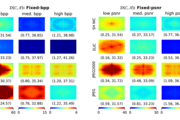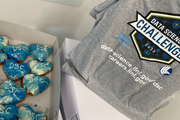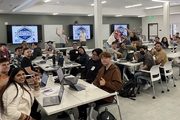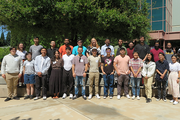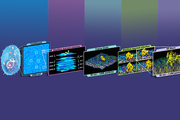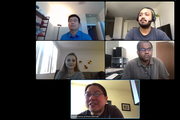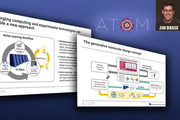Did you know we have a monthly newsletter? View past volumes and subscribe.
Welcome new DSI team members
April 2, 2024 -
When Data Science Institute (DSI) director Brian Giera and deputy director Cindy Gonzales began planning activities for fiscal year 2024 and beyond, they immediately realized that LLNL’s growth in data science and artificial intelligence (AI)/machine learning (ML) research requires corresponding growth in the DSI’s efforts. “Our field is booming,” Giera states. “The Lab has a stake in the...
Machine learning tool fills in the blanks for satellite light curves
Feb. 13, 2024 -
When viewed from Earth, objects in space are seen at a specific brightness, called apparent magnitude. Over time, ground-based telescopes can track a specific object’s change in brightness. This time-dependent magnitude variation is known as an object’s light curve, and can allow astronomers to infer the object’s size, shape, material, location, and more. Monitoring the light curve of...
Conference paper illuminates neural image compression
Dec. 8, 2023 -
An enduring question in machine learning (ML) concerns performance: How do we know if a model produces reliable results? The best models have explainable logic and can withstand data perturbations, but performance analysis tools and datasets that will help researchers meaningfully evaluate these models are scarce. A team from LLNL’s Center for Applied Scientific Computing (CASC) is teasing...
Heart smart: Future engineers tackle real-world cardiology concerns at LLNL's Data Science Challenge
Aug. 30, 2023 -
It’s a quick and pain-free way to test for heart problems. That’s why the electrocardiogram is so often used by doctors—with just a few electrodes and wires, the heart’s electrical activity can be measured and interpreted to identify irregularities and disease. But while it is a highly useful and commonly used diagnostic tool, there are limits to the types of information an electrocardiogram...
Making machine learning safer for biomedicine
Aug. 15, 2023 -
It’s hard to understate the impact machine learning will have on biomedicine. The ability to train computers to spot patterns by analyzing large, complex datasets is driving discoveries in heart disease, cancer, neurodegenerative diseases and more. For instance, Argonne National Laboratory (ANL) has used machine learning to aid cancer research and accelerate COVID-19 antiviral discovery. One...
UC Merced & UC Riverside tackle Data Science Challenge on ML-assisted heart modeling
Aug. 3, 2023 -
For the first time, students from the University of California (UC) Merced and UC Riverside joined forces for the two-week Data Science Challenge (DSC) at LLNL, tackling a real-world problem in machine learning (ML)-assisted heart modeling. Held in the Livermore Valley Open Campus’s newly remodeled University of California Livermore Collaboration Center from July 10-21, the event brought...
Data Science Challenge offers students learning and growth opportunities
July 24, 2023 -
About 20 UC Merced students spent the past two weeks working at LLNL to see if they can solve a problem that could have a significant impact on cardiology. The annual Data Science Challenge (DSC), a two-week, full-time internship at LLNL, this year teamed students from Merced and UC Riverside. They attempted to see if machine learning could address a gap in the information provided by the...
Consulting service infuses Lab projects with data science expertise
June 5, 2023 -
A key advantage of LLNL’s culture of multidisciplinary teamwork is that domain scientists don’t need to be experts in everything. Physicists, chemists, biologists, materials engineers, climate scientists, computer scientists, and other researchers regularly work alongside specialists in other fields to tackle challenging problems. The rise of Big Data across the Lab has led to a demand for...
Celebrating the DSI’s first five years
May 18, 2023 -
View the LLNL Flickr album Data Science Institute Turns Five.
Data science—a field combining technical disciplines such as computer science, statistics, mathematics, software development, domain science, and more—has become a crucial part of how LLNL carries out its mission. Since the DSI’s founding in 2018, the Lab has seen tremendous growth in its data science community and has invested...
Scientists develop model for more efficient simulations of protein interactions linked to cancer
March 28, 2023 -
LLNL scientists have developed a theoretical model for more efficient molecular-level simulations of cell membranes and their lipid-protein interactions, part of a multi-institutional effort to better understand the behavior of cancer-causing membrane proteins. Developed under an ongoing collaboration by the Department of Energy and the National Cancer Institute (NCI) aimed at modeling cell...
LLNL researchers win HPCwire award for applying cognitive simulation to ICF
Nov. 17, 2022 -
The high performance computing publication HPCwire announced LLNL as the winner of its Editor’s Choice award for Best Use of HPC in Energy for applying cognitive simulation (CogSim) methods to inertial confinement fusion (ICF) research. The award was presented at the largest supercomputing conference in the world: the 2022 International Conference for High Performance Computing, Networking...
Understanding the universe with applied statistics (VIDEO)
Nov. 17, 2022 -
In a new video posted to the Lab’s YouTube channel, statistician Amanda Muyskens describes MuyGPs, her team’s innovative and computationally efficient Gaussian Process hyperparameter estimation method for large data. The method has been applied to space-based image classification and released for open-source use in the Python package MuyGPyS. MuyGPs will help astronomers and astrophysicists...
LLNL team claims top AI award at international symbolic regression competition
Aug. 16, 2022 -
An LLNL team claimed a top prize at an inaugural international symbolic regression competition for an artificial intelligence (AI) framework they developed capable of explaining and interpreting real-life COVID-19 data. Hosted by the open source SRBench project at the 2022 Genetic and Evolutionary Computation Conference (GECCO), the competition had two tracks—synthetic and real-world—and...
Lab researchers win top award for machine learning-based approach to ICF experiments
Aug. 4, 2022 -
The IEEE Nuclear and Plasma Sciences Society (NPSS) announced an LLNL team as the winner of its 2022 Transactions on Plasma Science Best Paper Award for their work applying machine learning to inertial confinement fusion (ICF) experiments. In the paper, lead author Kelli Humbird and co-authors propose a novel technique for calibrating ICF experiments by combining machine learning with...
LLNL cancer research goes exascale
July 20, 2022 -
An LLNL team will be among the first researchers to perform work on the world’s first exascale supercomputer—Oak Ridge National Laboratory’s Frontier—when they use the system to model cancer-causing protein mutations. Led by Harsh Bhatia, a computer scientist in the Center of Applied Computing at LLNL, the team was awarded limited access to Frontier under the DOE's Advanced Scientific...
Panel discussion spotlights COVID-19 R&D
July 19, 2022 -
The DSI’s career panel series continued on June 28 to highlight some of LLNL’s COVID-19 research projects. Three data scientists—Emilia Grzesiak, Derek Jones, and Priyadip Ray—joined moderator and data scientist Stewart He to talk about their work in drug screening, protein–drug compounds, antibody–antigen sequence analysis, and risk factor identification.
He, who earned a PhD in Computer...
UC Merced students work with LLNL mentors on potential new drugs to combat COVID-19
June 30, 2022 -
Students from the University of California, Merced worked with mentors at LLNL to identify drug compounds that could be used to treat COVID-19 during a two-week Data Science Challenge (DSC) that concluded on June 6. For the first time in the DSC series since the COVID-19 pandemic began in 2020, Lab mentors visited the college campus to provide in-person guidance for five teams of UC Merced...
Assured and robust…or bust
June 30, 2022 -
The consequences of a machine learning (ML) error that presents irrelevant advertisements to a group of social media users may seem relatively minor. However, this opacity, combined with the fact that ML systems are nascent and imperfect, makes trusting their accuracy difficult in mission-critical situations, such as recognizing life-or-death risks to military personnel or advancing materials...
LLNL’s Brase discusses advances by ATOM in accelerating drug discovery pipeline
June 7, 2022 -
The private-public Accelerating Therapeutic Opportunities in Medicine (ATOM) consortium is showing “significant” progress in demonstrating that HPC and M) tools can speed up the drug discovery process, said Jim Brase, ATOM co-lead and LLNL’s deputy associate director for data science. The consortium currently boasts more than a dozen member organizations, including national laboratories...
Kevin McLoughlin applies computational biology to complex problems
May 17, 2022 -
Kevin McLoughlin has always been fascinated by the intersection of computing and biology. His LLNL career encompasses award-winning microbial detection technology, a COVID-19 antiviral drug design pipeline, and work with the ATOM consortium. The appeal for him in these projects lies at the intersection of computing and biology. “I love finding ways to visualize data that reveal relationships...



